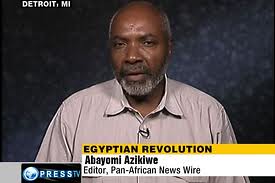
Abayomi Azikiwe, editor of the Pan-African News Wire, on Press TV discussing the political situation in Egypt on July 15, 2011. Azikiwe is an analyst on African affairs., a photo by Pan-African News Wire File Photos on Flickr.
‘Upcoming Egyptian president will face leadership problem
Sat May 26, 2012 11:50AM GMT
presstv.ir
To listen to the interview with Abayomi Azikiwe, director of Pan-African News Wire, on Press TV world news, just clip on the URL below:
http://presstv.com/detail/2012/05/26/243171/upcoming-egyptian-president-face-leadership-problems/
The new elected leadership, whether it’s going to be Mr. [Mohamed] Morsi of the Freedom and Justice Party, or Mr. Ahmed Shafiq, they will both face the same problems as any other leadership would have in regard to the domestic issues of Egypt as well as the international context in which these developments have taken place.”
Muslim Brotherhood spokesman Essam al-Arian has called for unity, warning that certain efforts are being made to bring Egypt’s old regime back to power.
Press TV has conducted an interview with Abayomi Azikiwe, director of Pan-African News Wire, from Detroit, to further discuss the issue. The following is a transcription of the interview.
Press TV: How likely, in your opinion, would it be that the Mubarak-era officials have an opportunity to come back to power again?
Azikiwe: Well it’s a very interesting development in the presidential race, the first round in Egypt. I think overall, though, it’s a significant time for the people of Egypt irrespective of the outcome of the June 16th and 17th runoff elections.
The new elected leadership, whether it’s going to be Mr. [Mohamed] Morsi of the Freedom and Justice Party, or Mr. Ahmed Shafiq, they will both face the same problems as any other leadership would have in regard to the domestic issues of Egypt as well as the international context in which these developments have taken place.
I think the success of the Freedom and Justice Party, which is aligned with the Muslim Brotherhood, is essentially a testament to their organizing, sometimes underground, sometimes outside of the official political system for decades. I think that organizing is revealed in the electoral arena.
Ahmed Shafiq is considered by many to be a part of the former NDP government under Mubarak, but whoever takes office will be compelled to implement at least some policies to speak directly to the aspirations of many Egyptians in regard to economic reform, relations with Israel, the United States and the pro-Western regimes in the entire region.
Press TV: Based on what you said about Ahmed Shafiq being with the old regime, what do you think would happen if Ahmed Shafiq makes it to the presidency, in your opinion? Would there be a second revolution to come?
Azikiwe: It will be very difficult to predict. Obviously, there are people inside of Egypt, inside the political culture there who still support the former military government, the former government of the National Democratic Party for whatever reasons whether it be the notion that this would present some stability to the society, that it would be something that would be more acceptable to the United States and to the European Union.
But at the same time, it’s obvious that there’s a ground swell of support for an alternative and that’s why the Islamic candidate did very well and there’s efforts from my understanding right now underway to form some type of an alliance that would possibly be led by the Freedom and Justice Party to try to ensure that Mr. Shafiq would not win. But it still remains to be seen what’s going to happen in the next few weeks.
Press TV: What is the role of parliament in Egypt’s political landscape at this point?
Azikiwe: Whoever’s elected president will have to be faced with the task of forming a new government, which may be a challenge, and also drafting another constitution for the country.
This process could take place in many different ways. One way it could draw in large numbers of people from civil society, from the youth, as well as from the Islamic community, and push these communities into a real dialogue about the future of Egypt.
At the same time, it could become a highly partisan political exercise which could cause polarization within Egypt.
Press TV: In the current situation which Egypt faces, what would happen to the Supreme Council of Armed Forces (SCAF) in the country? What lies ahead for them?
Azikiwe: Well I’m sure that the SCAF will be negotiating and positioning themselves, and it’s probably obvious that this has been taking place, to play a very prominent role in the new political dispensation of Egypt. Now how that’s going to play out overall in the long term, or maybe in the short term, remains to be seen.
As we mentioned before, whatever is the composition of the new elected cabinet of the president … and also the people who are going to draft the constitution, are going to be faced with similar problems.
They have to deal with economic reform. They have to deal with Egypt’s relationship to the state of Israel, to the United States, the role of the military overall in the Egyptian society; all of these variables are going to have to be dealt with. Irrespective of whether either leading candidate wins the runoff election next month.
No comments:
Post a Comment